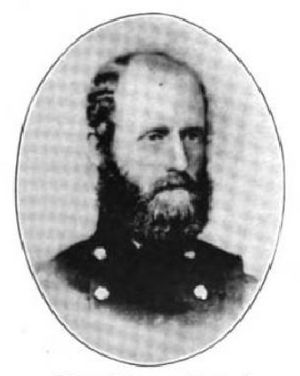Kenner Garrard facts for kids
Quick facts for kids
Kenner Garrard
|
|
|---|---|

Kenner Garrard
|
|
| Born | September 21, 1827 Bourbon County, Kentucky |
| Died | May 15, 1879 (aged 51) Cincinnati, Ohio |
| Place of burial |
Spring Grove Cemetery, Cincinnati, Ohio
|
| Allegiance | United States Union |
| Service/ |
United States Army Union Army |
| Years of service | 1851–1866 |
| Rank | |
| Commands held | Commandant of Cadets 146th New York Volunteer Infantry |
| Battles/wars | American Civil War |
Kenner Garrard (born September 21, 1827 – died May 15, 1879) was an important general in the Union Army during the American Civil War. He came from a famous military family in Ohio. Garrard was known for being very brave. He fought well in major battles like the Battle of Gettysburg and the Atlanta Campaign. Later, he was praised for his courage at the Battle of Nashville.
Contents
Early Life and Education
Kenner Garrard was born in Bourbon County, Kentucky. His grandfather, James Garrard, was the second Governor of Kentucky. Kenner grew up in Cincinnati, Ohio, and received a good private education.
He had two brothers, Jeptha Garrard and Israel Garrard, who also became generals in the Civil War. A cousin, Theophilus T. Garrard, was also a Union general.
Military Academy Training
Garrard briefly attended Harvard University. However, he left to join the United States Military Academy at West Point. He graduated in 1851, ranking eighth in his class.
After graduating, he became a second lieutenant. He first joined the 4th U.S. Artillery. Soon after, he moved to the 1st U.S. Dragoons.
In 1855, Garrard was transferred to the 2nd U.S. Cavalry. He worked with future Confederate generals Albert Sidney Johnston and Robert E. Lee. He was stationed at different military posts in the Southwest.
Civil War Service
When the Civil War began in 1861, Garrard was a captain in Texas. He was a loyal supporter of the Union. Confederate forces captured him after U.S. troops surrendered.
He was allowed to return to the North. He traveled to Washington, D.C.. He even brought $20,000 of government money he had hidden from Texas. He returned this money to the U.S. Treasury. In December 1861, he became the leader of the U.S. Military Academy in West Point, New York.
Key Battles and Commands
After being formally exchanged in August 1862, Garrard became a colonel. He led the 146th New York Infantry in the Army of the Potomac. He fought in important battles like Fredericksburg and Chancellorsville.
At the Battle of Gettysburg, he took command of a brigade. This happened after Brigadier General Stephen H. Weed was killed. In December 1863, he was promoted to brigadier general.
He was also made a major in the 3rd U.S. Cavalry. In December 1863, he became Chief of the Cavalry Bureau in Washington. However, he asked to be moved to a different role. He then took command of the 2nd Division of Cavalry. This unit was part of the Army of the Cumberland in the Western Theater.
Atlanta and Nashville Campaigns
Garrard led a cavalry division during General William T. Sherman's Atlanta Campaign. Later, he returned to leading infantry troops. He fought in the Battle of Nashville. Here, he and his division performed very well.
General George H. Thomas praised Garrard for his brave actions at Nashville. Because of this, he was promoted to major general in the volunteer army. He also became a brigadier general in the regular army. By the end of the war, he was a major general in the regular army. He helped capture Montgomery at the end of the war.
Life After the War
After the war, Kenner Garrard stayed in the regular army. He was in charge of the District of Mobile. However, he resigned from the army on November 9, 1866.
He returned to Cincinnati, Ohio. There, he worked as a real estate broker. He spent the rest of his life helping his community. He also studied history. For several years, he was a director for the Cincinnati Music Festival. He never married.
He wrote a book called Nolan's System for Training Cavalry Horses in 1862.
Kenner Garrard died in Cincinnati, Ohio, when he was 51 years old. He was buried in Spring Grove Cemetery.
 | Kyle Baker |
 | Joseph Yoakum |
 | Laura Wheeler Waring |
 | Henry Ossawa Tanner |

